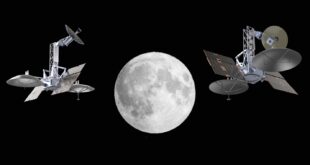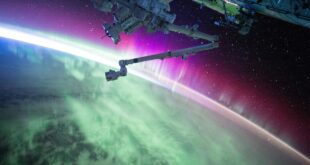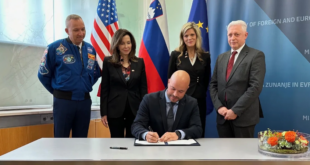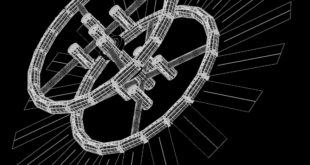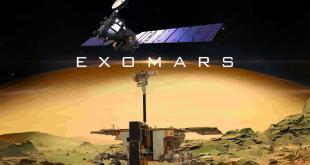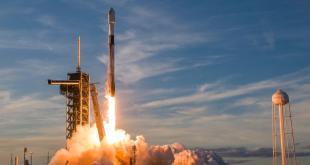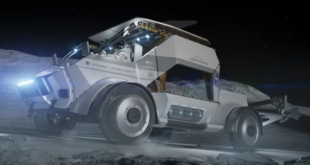ispace technologies U.S., inc. (ispace-U.S.) has announced the official launch of a new data relay service enabled by two relay satellites that will tentatively deploy during ispace-U.S.’s Mission 3 scheduled in 2026. SpaceX will also be tentatively providing the launch service. ispace-U.S. released the details for the relay service at the Lunar Surface Innovation Consortium 2024 Spring Meeting, which the Johns Hopkins Applied Physics Laboratory hosted.
Read More »#SpaceWatchGL: Search for Independence – European Prospects in the Field of Solar Weather Monitoring
In the last decade, space weather has become the subject of serious consideration in the scientific community and global scientific organizations. Solar activity plays an important role in both space operations and terrestrial infrastructure. Flares, storms, and coronal mass ejections are all manifestations of solar activity that can affect the operation of satellites, navigation, surveillance, radio communications, and other important structures. As a consequence, there is a need for a reliable and independent ecosystem for monitoring and forecasting solar weather. Today, the European space sector faces the challenge of creating infrastructure capable of competing with existing international initiatives.
Read More »Slovenia Joins Artemis Accords as 39th Signatory
Slovenia has become the 39th Signatory to the Artemis Accords after it and NASA affirmed their cooperation in future space endeavors on Friday. The signing certified Slovenia’s commitment to pursue safe and sustainable exploration of space for the benefit of humanity and took place during a U.S.-Slovenia strategic dialogue in Ljubljana, Slovenia, at the Ministry of Foreign Affairs Offices.
Read More »RIIS Appointed as Interim Host of DEA Program Management Office
The Research Institute for Innovation and Sustainability (RIIS) has become the interim host for the pan-African Digital Earth Africa Program Management Office, a free platform providing satellite imagery and products specific to the African continent. Digital Earth Africa is on track to improve the lives of African people and support decision-makers across the continent to assess, plan, and protect their countries from the potential impacts of climate change.
Read More »Switzerland Becomes Latest Signatory to the Artemis Accords
Switzerland has become the 37th member of the Artemis Accords, as Guy Parmelin, Swiss Federal Councillor and Minister for Economic Affairs, Education & Research, signed the Accords on behalf of Switzerland at NASA Headquarters in Washington on Monday, April 15. The signature consequently affirms Switzerland’s commitment to the sustainable and beneficial use of space for all humankind.
Read More »NASA and Japan Sign Agreement for Lunar Rover
NASA Administrator Bill Nelson and Japan’s Minister of Education, Culture, Sports, Science and Technology (MEXT) Masahito Moriyama have signed an agreement to advance sustainable human exploration of the Moon. As a result, Japan will design, develop, and operate a pressurized rover for crewed and uncrewed exploration on the Moon. On the other hand, NASA will provide the launch and delivery of the rover to the Moon as well as two opportunities for Japanese astronauts to travel to the lunar surface.
Read More »Vast Space to Equip Haven-1 With Starlink Connectivity
Vast Space has announced that its Haven-1 commercial space station will feature SpaceX's Starlink user terminal, consequently providing Gigabit/s speed low-latency connectivity to its crew users, internal payload racks, external cameras and instruments.
Read More »Thales Alenia Space Signs ESA Contract for ExoMars Mission
Thales Alenia Space has signed a framework contract divided into different tranches with the European Space Agency (ESA), worth a total of €522m, to continue essential activities for the completion of the ExoMars 2028 mission. The contract includes the development of the Mars Entry, Descent and Landing Module (EDLM) and maintenance activities on vehicles already built for the 2022 mission.
Read More »SpaceX Launches 11 Satellites Aboard New Bandwagon Mission
SpaceX has successfully launched 11 satellites for various clients on its new Bandwagon mission aboard the Falcon 9 rocket from Launch Complex 39A at NASA’s Kennedy Space Center. The mission launched satellites for Companies, including Capella Space, Hawkeye 360, Tata Advanced Systems Limited, Tyvak International, and the Institute for Q-shu Pioneers of Space, Inc. (iQPS). The Bandwagon-1 mission also launched a Synthetic Aperture Radar satellite for South Korea.
Read More »NASA Selects Companies to Advance Moon Mobility for Artemis
NASA has selected Intuitive Machines, Lunar Outpost, and Venturi Astrolab to advance capabilities for a lunar terrain vehicle (LTV) that Artemis astronauts will use to travel around the lunar surface. The LTV will consequently help Artemis Astronauts conduct scientific research during NASA's Artemis campaign on the Moon and preparations for human missions to Mars.
Read More » SpaceWatch.Global An independent perspective on space
SpaceWatch.Global An independent perspective on space

